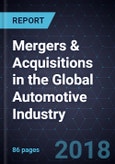More than 140 Active Acquirers to Target Innovative Startups in Multiple High-technology Acquisitions
The aim of this study is to analyze the impact of M&As on the overall automotive industry. It analyzes the past and current M&As and their impact on participating companies and the automotive industry as a whole.
Technological advancements in autonomous, connected, shared, and electric (CASE) vehicles are disrupting the traditional business models. M&As are utilized by both automotive and non-automotive companies to access innovation, intellectual property, and critical talent for the profitability and sustainability of their businesses.
With Apple, Google, and Uber capturing software and technology space in the automotive industry, automakers have the choice of either transforming themselves into software developers or acquiring high technology providers to compete against the disrupters. Consumer electronics companies are making their way into automotive supply chains with the acquisition of auto tech companies.
A case in point is Samsung’s strategic $8 billion acquisition of Harman to build assets in electronics to fulfill the major requirements of autonomous vehicles. Auto OEMs, acknowledging the increasing interest of tech companies in the automotive industry, are exploring acquisition opportunities to bring innovation in-house and save production costs.
As the growth opportunities and profit potential from CASE technologies is becoming clear, there will be more M&As, partnerships, and investments from industry participants to advance their market position in the new mobility landscape. The ongoing Daimler and BMW joint venture (JV) in the on-demand mobility space will change the competitive landscape in the shared mobility space.
The JV, if approved, will encourage other OEMs to experiment with this strategy. They will view shared mobility services as new revenue streams and join the market with the acquisition of e-hailing service providers.
Israel has become the most attractive market for acquiring startups, and has witnessed the acquisition of more than 105 startups in the last five years. Israel will continue to attract auto giants due to the presence of 600 auto tech startups, expertise in AI, communications, big data, and analytics. Auto OEMs, suppliers, and tech giants will acquire smaller firms with distinctive technologies to stay ahead of the competition.
The aim is to save on product enhancement R&D using the existing capacity of the acquired firm. Auto OEMs, while acquiring tech startups, will also look for mergers or JVs in their traditional vehicle manufacturing sector to increase their profit margins, market share, and strengthen their presence in emerging markets.
Research Scope
To provide a strategic overview of the current state of the industry with respect to M&As; covering major activities, focus areas, and their impact on the company’s revenue and market position.
To offer insights into the strategic initiatives taken by major companies; the ways in which they used M&As to tap into advanced auto tech and emerging business models.
To discuss the technological enhancements and their effect on business strategy ; the ways in which OEMs and tier 1 suppliers are using technology scouting centers to acquire startups in advanced auto tech.
To identify the major investment opportunities for companies, list potential startups that can be considered for acquisition or partnerships.
To understand the role of venture capitals and financial institutions undertaking M&A activity; the ways in which CVCs are used by their parent companies to acquire new business models.
Table of Contents
Companies Mentioned (Partial List)
A selection of companies mentioned in this report includes, but is not limited to:
- Apple
- BMW
- Daimler AG
- GM
- Harman
- Hyundai
- Jaguar
- Jaguar Land Rover
- Land Rover
- Mitsubishi
- Nissan
- PSA
- Renault
- Samsung
- Softbank
- Tata Motors
- Uber
- Volkswagen








